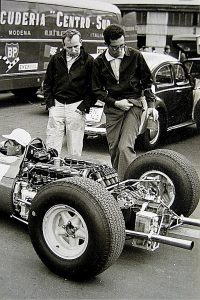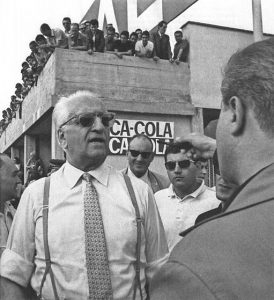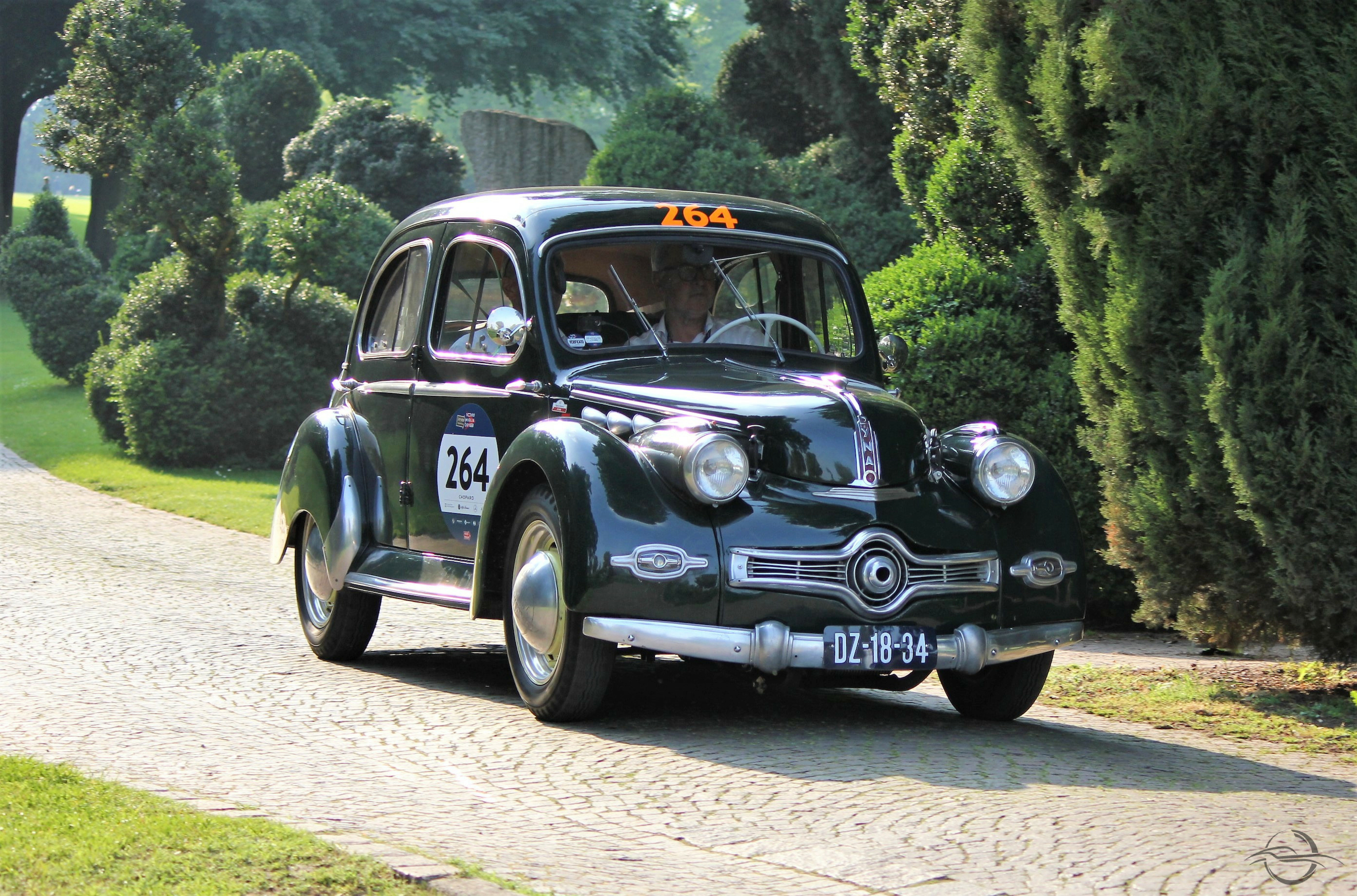Enzo Ferrari
Talis pater talis filius. Despite the differences in temperament and journey. If Forghieri’s dream were planes, his father’s footsteps lead him towards cars. Even though – and this is interesting – young Mauro’s graduation dissertation was a prelude to where his studies would lead him to.
– Excuse me, but if your plans were orientated to planes, why did you graduate with a dissertation on cars?
– At the time, I used to talk a lot about Europe with my professor and that is why I proposed him a dissertation about the car which I thought would have become the European car par excellence. Even though, to be honest, the future didn’t agree with me. I had aimed on a quick and fast car, with a simple engine. If you think that the most sought after cars today are SUV’s! The engine that I chose was Dyna Panhard’s Tiger: I drew the engine from scratch, by adding something, while I did very little in the car itself (otherwise it would have been too lengthy a dissertation).
- Panhard Dyna X86 1952, picture taken at Mille Miglia 2018
– The focus of my dissertation was the engine: a two-cylinder. Imagine driving a two-cylinder car today! The Fiat 500’s engine was a two-cylinder and I think that the 500 is the car which put most Italians on four wheels. Actually, I found out, that maybe it was the Fiat 127 which put the majority of Italians on four wheels because it was a car which one most sacrificed for. I mean, the 500 was a four-seat car, yes… but only if the children stayed “short”… whereas, the 127 was a car which truly had four seats (and maybe even five). However, the Fiat 500 remains the more “entertaining” car.
Just as a reminder, in 1972 the Fiat 127 was elected the car of the year, the design was by Pio Manzù and the engine by engineer Dante Giacosa, who is considered as one of the Italian motor school’s masters.
As a matter of fact, the young engineer Forghieri ended up working for Ferrari when he was twenty-seven and just graduated. He did that to trick time (in fact, his goals are still the United States and the aeronautic industry), following his father’s advice who is actually a man of Enzo Ferrari.
“The first Alfetta engine was born in Modena, at Enzo Ferrari’s house and the men who created it were four, my father included”, he comments very proudly.
If at the beginning the time working for Ferrari was considered as a waiting room, it soon became obvious that it’s quite the opposite. In ’61, young Mauro became the manager for all of the team’s sports activities.
– When Enzo Ferrari called me to put me in my place, I thought that he was mad, because I fully lacked the necessary experience. I was only 26 and I was fresh out of university. He told me: “You think about working as an engineer and don’t worry about anything else. I’ll be by your side”. And so he did. He always followed me, during good and bad times, often even when I was wrong, because he realised that when you have a manager and you show him that he was wrong, the manager automatically loses authority. That’s why he supported me.

Pic by Lothar Spurzem
– Of course, we know that Enzo Ferrari had an excellent eye for talent. Some say that his key quality was actually the ability to choose the right men. Did someone tell him about you?
– Yes, two people. Bazzi, who was one of Ferrari’s key men – defining him as a chief mechanic is reductive, he was actually his racing technical partner – and Jano, a great Italian engineer… he created the Lancia, just to be clear. Alfa Romeo and Fiat fought over him.
This doesn’t change the fact that the key element must have been Enzo Ferrari’s trust. That nose for talent that many – to this day –describe as being nearly a psychic virtue: a mysterious ability to “go beyond”. Some described interviews, which weren’t actually interviews by long silences, during which the Commendatore gazed at the candidate with his razor sharp eyes. Not one question was asked as if the answer didn’t lie (could not) in the words.
 – What was Enzo Ferrari like? I am the last suited person to judge him. I can only say that he was very different from the image that most people had of him. I was one of the few who had a dialogue with and who could speak to him face to face. Once, he told me that my cultural level made him uneasy. That surprised me: at the end of the day, he had his own honoris causa degree and, especially, he was the one who chose the life that he led… He always laughed, when we spoke about his degree: “It was less difficult for me”, he told me. Ferrari was a Knight Commander and I never wanted to tell him that I became a Grand Officer. If I did it, I knew that he would have been offended. When I left Ferrari, I did it because I felt that he was about to die. I told him: “Commendatore, I need to leave. I don’t want to stay here to watch you die”. Engineer Ghidella was against my choice, but the others understood it. Ferrari existed because he was able to call many men to him. It was one of his specific merits: to choose the right man for ‘that’ job. The so-called Ferrari miracle is mainly due to that. And it lasted for a long time. Enzo Ferrari made the right choice to make the cars there, in Maranello, in such a small borough: in that way, he took over the village. Do you understand? The village became part of Ferrari or vice-versa. And then, of course, Enzo Ferrari was clever enough to realise when he couldn’t go on, on his own, anymore. Which isn’t something that we all do.
– What was Enzo Ferrari like? I am the last suited person to judge him. I can only say that he was very different from the image that most people had of him. I was one of the few who had a dialogue with and who could speak to him face to face. Once, he told me that my cultural level made him uneasy. That surprised me: at the end of the day, he had his own honoris causa degree and, especially, he was the one who chose the life that he led… He always laughed, when we spoke about his degree: “It was less difficult for me”, he told me. Ferrari was a Knight Commander and I never wanted to tell him that I became a Grand Officer. If I did it, I knew that he would have been offended. When I left Ferrari, I did it because I felt that he was about to die. I told him: “Commendatore, I need to leave. I don’t want to stay here to watch you die”. Engineer Ghidella was against my choice, but the others understood it. Ferrari existed because he was able to call many men to him. It was one of his specific merits: to choose the right man for ‘that’ job. The so-called Ferrari miracle is mainly due to that. And it lasted for a long time. Enzo Ferrari made the right choice to make the cars there, in Maranello, in such a small borough: in that way, he took over the village. Do you understand? The village became part of Ferrari or vice-versa. And then, of course, Enzo Ferrari was clever enough to realise when he couldn’t go on, on his own, anymore. Which isn’t something that we all do.
By International Classic, written by Martina Fragale
Keep following the story Mauro Forghieri – Chapter 3
Read also:
Mauro Forghieri – Chapter 1
Mauro Forgheiri – Chapter 4
Discover the video



